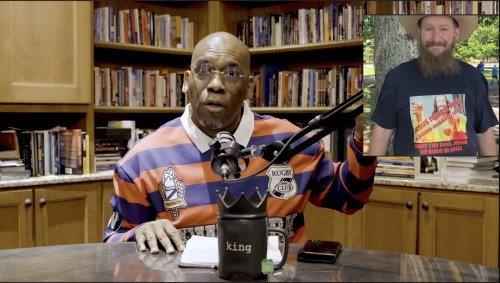Colon cancer is on pace to become the deadliest cancer under 50—but it doesn’t have to be
Katreena Davis of Georgia CORE discusses the troubling rise of colon cancer in young people and Black people, in particular.

Katreena Davis of Georgia CORE discusses the troubling rise of colon cancer in young people and Black people, in particular.
Colon cancer is rising in young people as experts and doctors work to understand why.
By 2030, the disease is projected to be the leading cause of cancer death among people under 50.
Beneath the troubling statistics and beyond the worrisome headlines, organizations like Georgia CORE, the Georgia Center for Oncology Research and Education, are working to spread awareness, increase access to screenings, and empower communities with the knowledge needed to prevent and detect the disease early. Their timing couldn’t be more urgent.
“It’s not just younger people in America, but it’s actually a world, global issue,” said Katreena Davis, Senior Program Manager at Georgia CORE, who has personally been impacted by colon cancer. “We are seeing an uptick in young individuals across the globe, and the researchers haven’t quite figured out exactly why.”
Colon cancer, also known as colorectal cancer, begins in the large intestine or rectum and often develops from small, noncancerous clumps of cells called polyps that form inside the colon. Over time, some of these polyps can develop into cancerous tumors. According to the American Cancer Society, when caught early, the five-year survival rate for localized colorectal cancer can be around 91%. But that number drops drastically when the disease is diagnosed at a more advanced stage.
For Black Americans, the numbers are even more alarming. Black men and women are about 20% more likely to be diagnosed with colorectal cancer and 40% more likely to die from it compared to most other racial groups. Davis said known risk factors include lifestyle, diet, environment, alcohol and tobacco use, genetics, and family history.
“There are even certain traits a person can inherit that make them more prone to developing the disease,” she noted. “That’s something a doctor can help rule out. Overall, we suggest that people try to limit their use of red meat, processed meats, alcohol, and be physically active.”
Davis also encouraged people to pay attention to their bodies—a practice that, while not glamorous, could save lives.
“I know no one likes to look at the stool or their poop,” she said with a laugh. “But getting to know what normal is for them—in terms of frequency, like how often people go to the restroom, and also looking at the stool’s shape, size, and color—helps. It’s not that you have to do a research paper about it, but just being aware of what’s typical for your body.”
Common warning signs of colon cancer include changes in stool frequency, consistency, and size, as well as unexplained weight loss, fatigue, or blood in the stool.
“Not everyone will get signs and symptoms, unfortunately,” Davis said. “But if we know what those are, we can act sooner, get help sooner, and hopefully, if there is an issue, get that addressed sooner than later.”
Part of what’s driving the rise in colon cancer deaths among younger people is that they are being diagnosed later—even though the disease is appearing earlier. The earlier a person receives a diagnosis, the higher their chance of survival. Treatment options and outcomes can change drastically depending on the stage of detection.
That’s why Davis and other experts are urging people to see their doctors regularly and pay attention to the rhythms of their bodies—especially in the Black community, where historical medical mistrust and disparities in access to care have led to delayed diagnoses and worse outcomes.
Visiting the doctor, especially scheduling a colonoscopy, can leave some people worried about the cost, particularly in today’s economy, as healthcare subsidies are expected to increase for millions of Americans next month.
“That’s a challenging barrier for a lot of people,” Davis acknowledged. But she emphasized that resources are available. “There are several programs that can help people get these screenings covered at no cost or at a reduced rate,” she said. “There are ways that we can get people the help that they need.”
Regardless of the challenges, Davis said it’s crucial that people take action—particularly within the Black community.
“Colon cancer is closer to our community than we think,” she said. “We have to act on it to make sure that we can protect ourselves and our communities by being mindful of our diet and other factors.”
She added, “We have to act on anything that looks out of place with our health. It should be our priority to make sure we take action on all of this.”
Share
What's Your Reaction?
 Like
0
Like
0
 Dislike
0
Dislike
0
 Love
0
Love
0
 Funny
0
Funny
0
 Angry
0
Angry
0
 Sad
0
Sad
0
 Wow
0
Wow
0

















